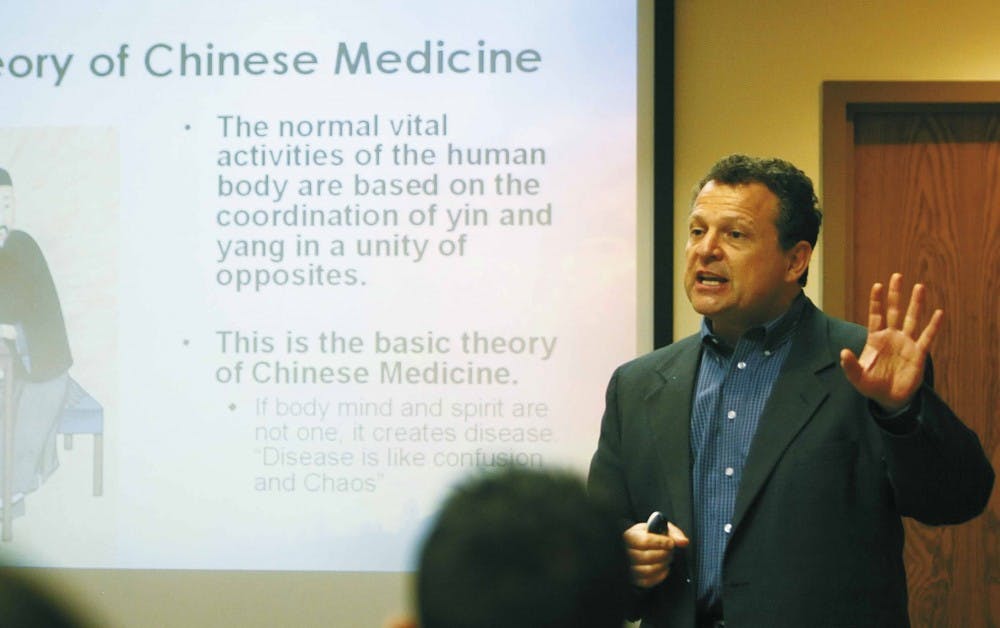by Jeremy Hunt
Daily Lobo
For couples who have a hard time conceiving, the Reproductive Medicine and Fertility Center hosts a fertility seminar at UNM once a month.
"In Search of the Stork" is free and open to the public.
The seminar is taught by Dr. Paul Magarelli, director of the center and board-certified reproductive endocrinologist and infertility specialist.
Get content from The Daily Lobo delivered to your inbox
The seminar educates people about the causes of infertility and things they can do to increase their chances of pregnancy, Magarelli said.
"It's an open forum to ask questions," he said. "They're not sure what they need to actually ask their physicians what to do or where to go to get help."
There are seminars scheduled from April to September. They are from 6 to 8 p.m. in Room 240 of UNM's Cancer Research and Treatment Center.
Magarelli said pregnant couples often claim it's easy to have children.
"What everyone forgets is they practiced the act of reproduction hundreds and hundreds of times before they get pregnant," he said.
A common misconception that many people have is that it takes only one sperm to fertilize an egg, he said.
"It's like a king who conquered a castle," he said. "He gets to the gate and says, 'I have conquered this castle,' and he looks around the gate and sees 400 million dead soldiers. The soldiers definitely helped a lot."
Most couples who take the seminar don't realize reproduction is a two-way street, and half the time, it's the man who has problems, Magarelli said.
"That surprises the heck out of everybody," he said. "The politics of reproduction are such that we put the blame on the female when there is no blame."
Magarelli said women often think their bodies produce eggs.
"Women do not make any eggs in their lifetime," he said. "They're born with all the eggs they're ever going to have."
Magarelli said women have about 400 eggs that could be fertilized during their lifetime.
The seminar educates people about procedures, such as freezing unfertilized eggs, Magarelli said.
"Prior to two years ago, we didn't know how to freeze eggs," he said. "Women had to freeze their eggs fertilized."
Magarelli said it's important to raise awareness about reproduction because most people don't have a biological understanding of it.
"My concern is to help couples achieve families," he said. "We try to focus the patient on getting the tools necessary to getting the best, most efficient outcome."
BOX:
"In Search of the Stork" timesand location:
˙ Monday, April 23, 6-8 p.m. in UNM CRTC, Room 240
˙ Monday, June 4, 6-8 p.m. in UNM CRTC, Room 240
˙ Monday, July 9, 6-8 p.m. in UNM CRTC, Room 240
˙ Monday, Aug. 13, 6-8 p.m. in UNM CRTC, Room 240
˙ Monday, Sept. 17, 6-8 p.m. in UNM CRTC, Room 240
Call 272-3886 for reservations
Fertility statistics:
Women:
˙ At 15, have a 20 percent to 25 percent chance of getting pregnant every month
˙ At 30, have a 10 percent chance per month
˙ At 40, have a 3 percent to 5 percent chance per month
˙ At 45, have a less than 1 percent chance per month
Men:
˙ Lose 15 percent to 20 percent of sperm potency between 20 and 40
Tips to improvefertility:
˙ Avoid alcohol
˙ Don't use tobacco
˙ Take supplemental vitamins
˙ Don't use marijuana or other illegal drugs
˙ Women shouldn't drink more than one caffeinated beverage a day
˙ Men shouldn't wear tight pants or shorts
˙ Men should stay hydrated
Source: Dr. Paul Magarelli, director of UNM's Reproductive Medicine and Fertility Center and board-certified reproductive endocrinologist and infertility specialist






